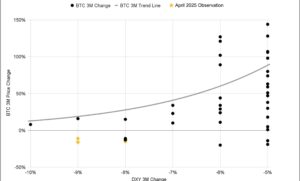HIFO: The Tax Loophole That Could Be Helping Bitcoin Investors This Tax Season | Bitcoinist.com

‘Highest in, first out’ aka HIFO is a tax accounting method that can be a very good thing to know as an investor dabbling In crypto this past year. As we approach tax season and related questions continue to rise to the top, let’s take a look at a tax methodology that we are seeing mentioned more and more.
‘Peep The Tax Methodology’
A higher cost basis translates to less taxes on your sales, because with capital gains, the equation boils down to your sales price minus the cost basis of each respective asset. HIFO, which stands for ‘highest in, first out’ is an accounting method that has been cited to slash an investor’s obligation, if utilized appropriately. In the madness of the market while selling your crypto, you can pick and choose the specific unit you are selling. To simplify it down a bit, a crypto holder can pick out the most expensive bitcoin they bought and pick that to be used to determine their tax obligation. Please note that these activities may vary based on your tax jurisdiction and this is not accounting advice.
Related Reading Microsoft To Acquire Activision Blizzard, How Does This Fit With Its
In the states, the IRS’s guidance thus far seemingly states that crypto investors can use HIFO – provided that they keep detailed records and can identify specific units of cryptocurrency.
Bitcoin is down around 36% from its all-time high in November, but the dip was a plus to some, due to a quirk in the tax code that helps crypto holders shield their winnings from the IRS. As many juggle an increasingly confusing landscape, finding different methods to save on taxes is always a win. The IRS treats crypto somewhat similar to property, in that anytime you spend, exchange, or sell your tokens, you’re logging a taxable event. There’s always a difference between how much you paid for your crypto, which is the cost basis, and the market value at the time you spend it. That difference can trigger capital gains taxes.
BTC: Bitcoin bouncing back after hitting all time high in NOV 2021 | BTC:USD on tradingview.com
How HIFO could potentially help taxpayers, when it comes selling crypto, you can pick and choose the specific unit you are selling. This means (ideally) that any crypto holder can pick out the most expensive bitcoin they have purchased and use that number to determine their tax obligation. A higher cost basis translates to less burden on your sales.
Hehan Chandrasekera, a CPA and head of tax strategy at crypto software company CoinTracker.io, stated to CNBC that “people rarely use it because it requires keeping good records or using crypto software.” She then added “but the thing is, lots of folks now use that kind of software, which makes this kind of accounting super easy. They just don’t know it exists.”
Under often-standard FIFO accounting rules, when you sell your tokens, you’re selling the earliest purchased coin. If you bought your crypto before its big price run-up in 2021, your low cost basis can mean a bigger capital gains bill.
This method, though effective, isn’t always the most ideal – but that doesn’t pull from the potential effectiveness of HIFO, so long as you’re keeping granular details about every crypto transaction you made for each coin you own (along with when you purchased it and for how much, as well as when you sold it and the market value at that time).
At the end of the day, you will want to seek professional help when it comes to taxes.
Related Reading Ethereum Leads Cardano In Terms Of Volume. But Fees Tell A Different Story
Source link
#HIFO #Tax #Loophole #Helping #Bitcoin #Investors #Tax #Season #Bitcoinistcom





